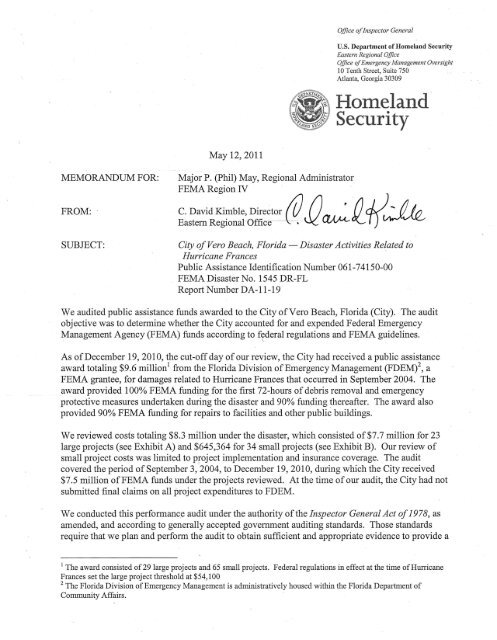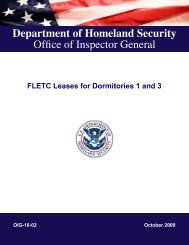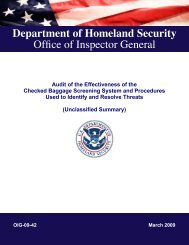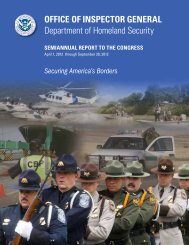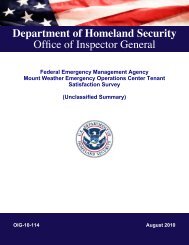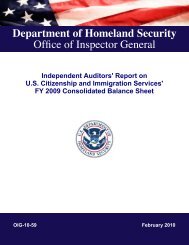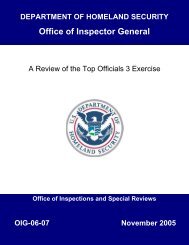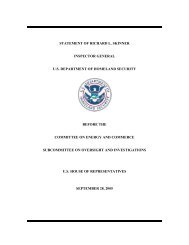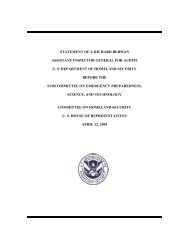City of Vero Beach, Florida - Office of Inspector General - Homeland ...
City of Vero Beach, Florida - Office of Inspector General - Homeland ...
City of Vero Beach, Florida - Office of Inspector General - Homeland ...
You also want an ePaper? Increase the reach of your titles
YUMPU automatically turns print PDFs into web optimized ePapers that Google loves.
<strong>Office</strong> <strong>of</strong><strong>Inspector</strong> <strong>General</strong><br />
U.S. Department <strong>of</strong> <strong>Homeland</strong> Security<br />
Eastern Regional <strong>Office</strong><br />
<strong>Office</strong> <strong>of</strong>Emergency Management Oversight<br />
10 Tenth Street, Suite 750<br />
Atlanta, Georgia 30309<br />
<strong>Homeland</strong><br />
Security<br />
May 12, 2011<br />
MEMORANDUM FOR:<br />
FROM:<br />
Major P. (Phil) May, Regional Administrator<br />
:E:::::Drrector /t7 11 . ~ j ~<br />
Eastern ReglOnal-()ffic-e--l-~ ~~~15 v<br />
SUBJECT: <strong>City</strong> <strong>of</strong><strong>Vero</strong> <strong>Beach</strong>, <strong>Florida</strong> - Disaster Activities Related to<br />
Hurricane Frances<br />
Public Assistance Identification Number 061-74150-00<br />
FEMA Disaster No. 1545 DR-FL<br />
Report Number DA-11-19<br />
We audited public assistance funds awarded to the <strong>City</strong> <strong>of</strong><strong>Vero</strong> <strong>Beach</strong>, <strong>Florida</strong> (<strong>City</strong>). The audit<br />
objective was to determine whether the <strong>City</strong> accounted for and expended Federal Emergency<br />
Management Agency (FEMA) funds according to federal regulations and FEMA guidelines.<br />
\.<br />
As <strong>of</strong> December 19, 2010, the cut-<strong>of</strong>f day <strong>of</strong> our review, the <strong>City</strong> had received a public assistance<br />
award totaling $9.6 million l from the <strong>Florida</strong> Division <strong>of</strong>Emergency Management (FDEM)2, a<br />
FEMA grantee, for damages related to Hurricane Frances that occurred in September 2004. The<br />
award provided 100% FEMA fundingfor the first 72-hours <strong>of</strong> debris removal and emergency<br />
protective measures undertaken during the disaster and 90% funding thereafter. The aW'lrd also<br />
provided 90% FEMA funding for repairs to facilities and other public buildings.<br />
We reviewed costs totaling $8.3 million under the disaster, which consisted <strong>of</strong> $7.7 million for 23<br />
large projects (see Exhibit A) and $645,364 for 34 small projects (see Exhibit B). Our review <strong>of</strong><br />
small project costs was limited to project implementation and insurance coverage. The audit<br />
covered the period <strong>of</strong> September 3,'2004, to December 19,2010, during which the <strong>City</strong> received<br />
$7.5 million <strong>of</strong>FEMA funds under the projects reviewed. At the time <strong>of</strong> our audit, the <strong>City</strong> had not<br />
submitted final claims on all project expenditures to FDEM.<br />
We conducted this performance audit under the authority <strong>of</strong> the <strong>Inspector</strong> <strong>General</strong> Act <strong>of</strong>1978, as<br />
amended, and according to generally accepted government auditing standards. Those standards<br />
require that we plan and perform the audit to obtain sufficient and appropnate evidence to provide a<br />
1 The award consisted <strong>of</strong>29 large projects and 65 small projects. Federal regulations in effect at the time <strong>of</strong> Hurricane<br />
Frances set the large project threshold at $54,100<br />
2 The <strong>Florida</strong> Division <strong>of</strong> Emergency Management is administratively housed within the <strong>Florida</strong> Department <strong>of</strong><br />
Community Affairs.
easonable basis for our findings and conclusions based on our audit objective. We believe that the<br />
evidence obtained provides a reasonable basis for our findings and conclusions based on our audit<br />
objective.<br />
We reviewed the <strong>City</strong>’s disaster grant accounting system and contracting policies and procedures;<br />
reviewed judgmentally selected project cost documentation (generally based on dollar value);<br />
interviewed <strong>City</strong>, FDEM, and FEMA personnel; reviewed applicable federal regulations and FEMA<br />
guidelines; and performed other procedures considered necessary to accomplish our objective. We<br />
did not assess the adequacy <strong>of</strong> the <strong>City</strong>’s internal controls applicable to its grant activities because it<br />
was not necessary to accomplish our objective. We did, however, gain an understanding <strong>of</strong> the<br />
<strong>City</strong>’s method <strong>of</strong> grant accounting and its policies and procedures for administering the activities<br />
provided for under the FEMA awards.<br />
RESULTS OF AUDIT<br />
The <strong>City</strong>’s accounting system did not separately account for project expenditures on a project-byproject<br />
basis as required by federal regulation. We also identified $2.6 million (federal share $2.3<br />
million) <strong>of</strong> ineligible and unsupported project costs. Additionally, the <strong>City</strong> did not always comply<br />
with FEMA guidelines and federal regulations when contracting for debris removal activities.<br />
Finding A: Project Accounting<br />
The <strong>City</strong>’s grant accounting system did not separately account for project expenditures on a projectby-project<br />
basis (44 CFR 206.205) nor permit the tracing <strong>of</strong> funds to a level <strong>of</strong> expenditures<br />
adequate to establish that such funds have been used according to the applicable regulations and<br />
guidelines (44 CFR 13.20(a)(2)). The <strong>City</strong> established special accounts within its general ledger to<br />
record disaster expenditures and revenues. However, individual project receipts and expenditures<br />
could not be readily identified and traced to supporting documentation without direct assistance from<br />
<strong>City</strong> <strong>of</strong>ficials. In addition, disaster expenditures and revenues for Hurricanes Frances were<br />
commingled with Hurricane Jeanne, a disaster that occurred a few weeks after Frances.<br />
The <strong>City</strong> did maintain separate folders by project number that contained invoices, time sheets,<br />
equipment usage records, and payment records for expenditures related to FEMA projects. We used<br />
these records to conduct the audit.<br />
<strong>City</strong> Response. <strong>City</strong> <strong>of</strong>ficials said that they employed standard accounting procedures that had been<br />
accepted for federal grants in the past and they had no reason to believe they would not be accepted<br />
for FEMA grants. <strong>City</strong> <strong>of</strong>ficials also said that there were no expenditures or revenues that were<br />
identified as being misclassified and that all expenditures and revenues could be identified with the<br />
related assistance.<br />
OIG Response. We disagree. We identified several transactions that were misclassified as a result<br />
<strong>of</strong> commingling expenditures and revenues for Hurricane Frances with Hurricane Jeanne.<br />
2
Finding B: Losses Covered by Insurance.<br />
The <strong>City</strong>’s claim included $2.1 million <strong>of</strong> losses that were covered by insurance. Section 312 <strong>of</strong> the<br />
Robert T. Stafford Disaster Relief and Emergency Assistance Act, as amended, prohibits duplicate<br />
benefits such as the use <strong>of</strong> public assistance funds for damages covered by insurance.<br />
At the time <strong>of</strong> our audit, FEMA had not completed its insurance review to determine insured losses<br />
because the <strong>City</strong> did not have a statement <strong>of</strong> loss to identify disaster damages and did not have an<br />
adequate accounting <strong>of</strong> insurance proceeds received and paid directly to contractors performing<br />
disaster-related work. According to <strong>City</strong> <strong>of</strong>ficials, its insurance carrier had been unresponsive since<br />
2005 to many requests for a schedule <strong>of</strong> insurance settlement.<br />
We reviewed the <strong>City</strong>’s insurance policy, which included the Schedule <strong>of</strong> Properties insured. The<br />
Schedule identified the location, building number, address, occupancy, construction structure, and<br />
building and personal limit coverage for insured facilities. Using this information and scopes <strong>of</strong><br />
work authorized on individual project worksheets, we identified $2,141,652<strong>of</strong> claimed costs that<br />
were covered under the <strong>City</strong>’s insurance policy. We question the $2,141,652 as shown in the table<br />
below.<br />
Number<br />
<strong>of</strong><br />
Projects<br />
Total<br />
Amount<br />
Claimed<br />
Number <strong>of</strong><br />
Projects<br />
Covered by<br />
Insurance<br />
Questioned<br />
Costs<br />
Description <strong>of</strong> Activities<br />
Repairs <strong>of</strong> Building and Contents 19 $ 1,778,512 12 $1,491,562<br />
Repairs <strong>of</strong> Utilities 9 2,091,401 4 531,345<br />
Repairs <strong>of</strong> Recreation Facilities and<br />
Other 14 549,096 4 118,745<br />
Grand Total 42 $ 4,419,009 20 $2,141,652<br />
<strong>City</strong> Response. <strong>City</strong> <strong>of</strong>ficials said they have been working diligently to get the needed information<br />
from their insurance carrier so that FEMA and FDEM can complete its review.<br />
Finding C: Supporting Documentation<br />
Cost Principles at 2 CFR 225, Cost Principles for State, Local, and Indian Tribal Governments,<br />
Appendix A, Section C.1.j, 3 ,state that a cost must be adequately documented to be allowable under<br />
federal awards. The <strong>City</strong>’s claim <strong>of</strong> $651,202 under Project 4123 included $351,950 <strong>of</strong> contract<br />
labor and equipment charges that were not adequately supported by source documentation such as<br />
time and attendance records and/or foreman labor activity logs and equipment usage records.<br />
Therefore, we question the unsupported charges <strong>of</strong> $351,950.<br />
<strong>City</strong> Response. <strong>City</strong> <strong>of</strong>ficials said that the project’s costs had been reviewed and closed out by<br />
FDEM and FEMA in 2009. They believed that sufficient records had been maintained to support the<br />
costs and that the costs should not be questioned 6 plus years after the work had been completed.<br />
3 OMB Circular A-87, in effect at the time <strong>of</strong> the disaster, was relocated to 2 CFR, Part 225, on August 31, 2005.<br />
3
OIG Response. We could not validate the eligibility <strong>of</strong> the contractor’s billings without adequate<br />
source documentation. Although the costs may have been accepted during the close-out process, it<br />
does not affect a federal agency’s right to disallow costs and recover funds on the basis <strong>of</strong> a later<br />
audit (44 CFR 13.51(a)). In addition, 44 CFR 13.42(b), and (c) require that records be retained for 3<br />
years after the grantee submits the final expenditure report to the awarding agency.<br />
Finding D: Small Project Work Not Completed<br />
According to 44 CFR 206.205(a), failure to complete work under a small project may require that<br />
the federal payment be refunded. In addition, FEMA’s Public Assistance Guide (FEMA 322, April<br />
1999, p. 114), states that a grant recipient has 18 months from the disaster declaration date to<br />
complete work under permanent repair projects. The State may grant extensions for an additional 30<br />
months under extenuating circumstance, and FEMA may grant extensions beyond the State’s<br />
authority appropriate to the situation.<br />
The <strong>City</strong> received $113,054 <strong>of</strong> FEMA funding under seven small projects to complete permanent<br />
repairs related to Hurricane Frances, which occurred in September 2004. However, the <strong>City</strong> was<br />
unable to provide documentation showing that $69,672 <strong>of</strong> items listed in the projects’ scope <strong>of</strong> work<br />
had been completed. Because FEMA had not granted time extensions beyond the State’s authority<br />
(48 months), we question the $69,672 as shown in the following table.<br />
Project<br />
Number<br />
Category<br />
<strong>of</strong> Work 4<br />
Amount<br />
Awarded/Received<br />
Amount<br />
Questioned<br />
598 Category G $ 7,108 $ 5,904<br />
1655 Category E 18,023 11,957<br />
2658 Category E 4,677 4,579<br />
3590 Category G 3,769 970<br />
3631 Category G 47,269 14,054<br />
3648 Category G 11,234 11,234<br />
8662 Category G 20,974 20,974<br />
Total $113,054 $69,672<br />
<strong>City</strong> Response. <strong>City</strong> <strong>of</strong>ficials said that FEMA told them <strong>of</strong> their obligation to complete the repairs<br />
and that small projects were to their advantage because they did not require audits or close-outs.<br />
OIG Response. All projects are subject to audit, and federal regulation requires that authorized work<br />
under small projects be completed for funding to be retained.<br />
Finding E: Time-and-Material Contract Charges<br />
The <strong>City</strong>’s claim under Project 4123 included $29,550 <strong>of</strong> excessive contract labor charges. After the<br />
storm, the <strong>City</strong> used contractors to remove trees and limbs from around electrical lines to facilitate<br />
power restoration. The <strong>City</strong> hired the contractors using its emergency contracting procedures and<br />
paid them a total <strong>of</strong> $651,202 on a time-and-material basis. However, the time-and-material debris<br />
removal work continued beyond FEMA’s 70-hour window allowing this type <strong>of</strong> contract (FEMA<br />
4<br />
Category G represents permanent work for recreational and other buildings, and Category E represents permanent work<br />
for public buildings and facilities.<br />
4
325, April 1999, p. 28); and the <strong>City</strong> did not perform a cost or price analysis to determine the<br />
reasonableness <strong>of</strong> the contractors’ proposed prices (44 CFR 13.36(f)).<br />
One contractor charged the <strong>City</strong> double-time and time-and-a half hourly rates for all hours worked<br />
while another contractor charged straight time rates for a 40-hour work week and overtime rates for<br />
all hours worked beyond 40. According to 2 CFR 225, Cost Principles for State, Local, and Indian<br />
Tribal Governments, Appendix A, C.1.a, costs under federal awards must be both reasonable and<br />
necessary. In determining reasonableness, the cost principles require grant recipients to consider<br />
sound business practices, federal regulations and guidelines, and market price for comparable goods<br />
and services. It was unreasonable for the <strong>City</strong> to pay one contractor significantly more than another<br />
for similar work. Therefore, we did not question the contractor’s charges for the first 70-hours <strong>of</strong><br />
emergency work, but adjusted the remaining billing hours to reflect the billing method used by the<br />
other contractor (straight time rates for the first 40-hours <strong>of</strong> work and overtime rates for all hours<br />
worked in excess <strong>of</strong> 40). This calculation resulted in $29,550 <strong>of</strong> excessive contract labor charges.<br />
Therefore, we question $29,550.<br />
<strong>City</strong> Response. <strong>City</strong> <strong>of</strong>ficials said the finding should be dropped because FEMA had accepted the<br />
costs during project close out.<br />
OIG Response. The fact that FEMA or the grantee may have accepted the costs during the close-out<br />
process does not affect a federal agency’s right to disallow costs and recover funds on the basis <strong>of</strong> a<br />
later audit (44 CFR 13.51(a)). In addition, costs under federal awards must be reasonable to be<br />
eligible for federal funding.<br />
RECOMMENDATIONS<br />
We recommend the Regional Administrator, FEMA Region IV:<br />
Recommendation #1: Instruct the <strong>City</strong>, for future declarations, to account for FEMA<br />
funding on a project-by-project basis as required by federal regulations (Finding A).<br />
Recommendation #2: Disallow $2,141,652 (federal share $1,927,486) <strong>of</strong> ineligible costs for<br />
activities covered by insurance (Finding B).<br />
Recommendation #3: Disallow $351,950 (federal share $316,755) <strong>of</strong> unsupported project<br />
charges (Finding C).<br />
Recommendation #4: Disallow $69,672 (federal share $62,705) <strong>of</strong> ineligible costs for small<br />
project work not fully completed (Finding D).<br />
Recommendation #5: Instruct the <strong>City</strong>, for future declarations, to comply with federal<br />
regulations and FEMA guidelines governing contracting practices (Finding E).<br />
Recommendation #6: Disallow $29,550 (federal share $26,595) <strong>of</strong> contract labor costs<br />
determined to be ineligible because they were excessive (Finding E).<br />
5
DISCUSSION WITH MANAGEMENT AND AUDIT FOLLOW-UP<br />
We discussed the audit results with FEMA, <strong>City</strong>, and FDEM <strong>of</strong>ficials during the course <strong>of</strong> our audit.<br />
We also provided written summaries <strong>of</strong> our findings and recommendations in advance to these<br />
<strong>of</strong>ficials and discussed them at an exit conference on January 13, 2011. <strong>City</strong> <strong>of</strong>ficials disagreed with<br />
all audit findings included in the audit report. Their comments, where appropriate, are included in<br />
the body <strong>of</strong> this report.<br />
Please advise me by August 9, 2011, <strong>of</strong> the actions taken or planned to implement the<br />
recommendations contained in this report, including target completion dates for any planned actions.<br />
To promote transparency, this final report and your response to this report, including your corrective<br />
actions planned, will be posted to our website, with exception <strong>of</strong> sensitive information identified by<br />
your <strong>of</strong>fice. Should you have any questions concerning this report, please contact me at (404) 832-<br />
6702, or Felipe Pubillones, Audit Manager, at (404) 832-6705. Key contributors to this assignment<br />
were Felipe Pubillones, Vilmarie Serrano, and Nadine Ramjohn.<br />
cc: Mary Lynne Miller, Deputy Regional Administrator<br />
Jesse Munoz, Director Recovery<br />
Valerie Rhoads, Branch, Chief PA<br />
Denise Harris, Administrative Specialist<br />
Robert Ives, FL Recovery <strong>Office</strong> Director<br />
Stuart G. Baker, Regional Counsel<br />
Bryan Taylor, Emergency Analyst<br />
Hope Ayers, Assistant Regional Counsel<br />
Audit Liaison, FEMA<br />
GAO-OIG Liaison<br />
6
<strong>City</strong> <strong>of</strong> <strong>Vero</strong> <strong>Beach</strong>, <strong>Florida</strong><br />
FEMA Disaster 1545 DR-FL<br />
Schedule <strong>of</strong> Amount Awarded, Claimed, and Questioned<br />
September 3, 2004, to December 19, 2010<br />
Large Projects<br />
EXHIBIT A<br />
Project<br />
Number<br />
Amount<br />
Awarded<br />
Amount<br />
Claimed/Reviewed<br />
Amount<br />
Questioned<br />
613 $1,578,759 $1,578,759 $ 0<br />
621 790,979 790,979 0<br />
630 65,859 57,772 0<br />
631 246,223 7,500 0<br />
1605 88,404 88,404 0<br />
1698 223,679 223,679 0<br />
3592 193,332 193,332 0<br />
3629 62,427 62,427 0<br />
4123 651,203 651,203 381,500<br />
4125 369,799 369,799 0<br />
4126 565,184 565,184 0<br />
5716 603,140 603,140 0<br />
7769 371,702 371,702 371,702<br />
8127 84,191 84,191 0<br />
8300 172,042 137,219 137,219<br />
8574 222,514 222,514 222,514<br />
8575 577,158 577,158 520,510<br />
8578 445,629 445,629 445,629<br />
8609 128,462 128,462 128,462<br />
8647 168,020 168,020 0<br />
8651 59,030 59,030 0<br />
8652 229,729 229,729 0<br />
8669 56,456 56,456 0<br />
Total $7,953,921 $7,672,288 $2,207,536<br />
7
<strong>City</strong> <strong>of</strong> <strong>Vero</strong> <strong>Beach</strong>, <strong>Florida</strong><br />
FEMA Disaster 1545 DR-FL<br />
Schedule <strong>of</strong> Amount Awarded, Claimed, and Questioned<br />
September 3, 2004, to December 19, 2010<br />
Small Projects<br />
EXHIBIT B<br />
Project<br />
Number<br />
Amount<br />
Awarded<br />
Amount<br />
Claimed/Reviewed<br />
Amount<br />
Questioned<br />
252 $ 39,547 $ 39,547 $ 39,547<br />
598 7,108 7,108 5,904<br />
1655 18,023 18,023 11,957<br />
1878 2,047 2,047 2,047<br />
1879 23,277 23,277 23,277<br />
1896 31,997 31,997 0<br />
1900 40,023 40,023 29,392<br />
1905 41,329 41,329 25,662<br />
2658 4,677 4,677 4,579<br />
2737 13,978 13,978 13,978<br />
3202 14,665 14,665 14,665<br />
3590 3,769 3,769 970<br />
3594 46,799 46,799 46,799<br />
3596 7,520 7,520 5,874<br />
3631 47,269 47,269 14,054<br />
3648 11,234 11,234 11,234<br />
4715 8,021 8,021 0<br />
4719 13,912 13,912 0<br />
5349 1,896 1,896 0<br />
6260 10,500 10,500 10,500<br />
6261 1,710 1,710 1,710<br />
7810 44,835 44,835 0<br />
8307 52,347 52,347 52,347<br />
8317 11,370 11,370 11,370<br />
8362 31,148 31,148 26,524<br />
8363 11,152 11,152 0<br />
8648 11,924 11,924 11,924<br />
8649 11,870 11,870 0<br />
8657 20,508 20,508 0<br />
8658 5,140 5,140 0<br />
8659 12,533 12,533 0<br />
8661 5,829 5,829 0<br />
8662 20,974 20,974 20,974<br />
8672 16,433 16,433 0<br />
Total $645,364 $645,364 $ 385,288<br />
8


